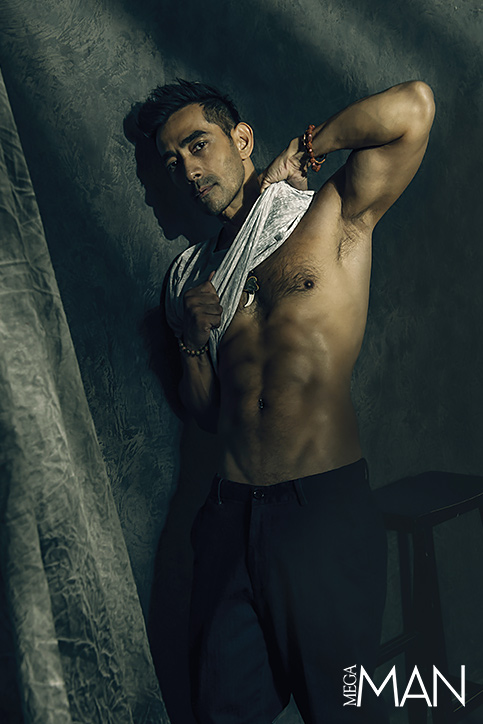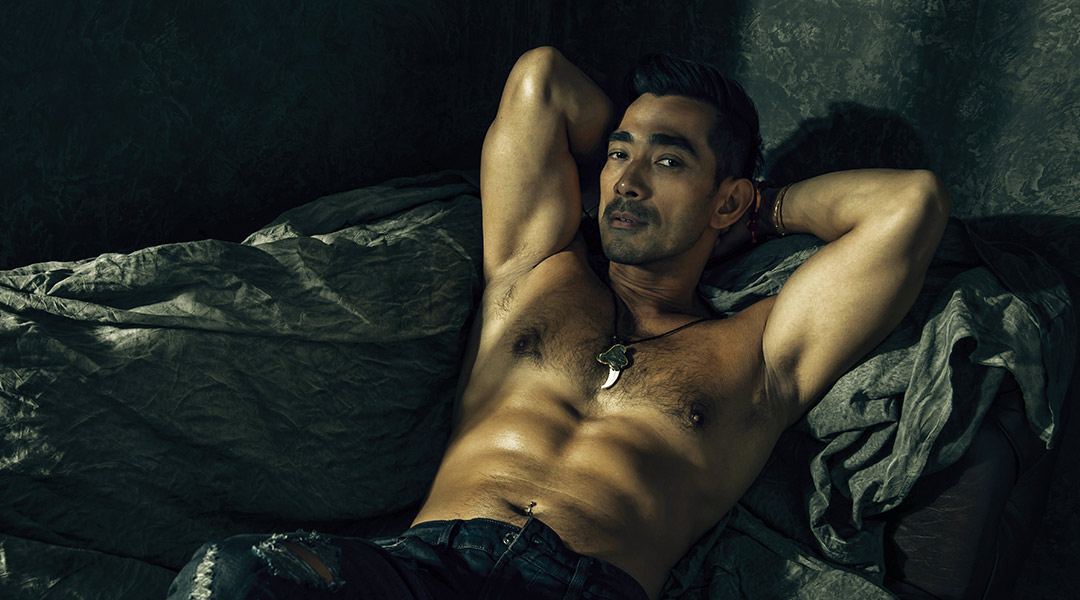What was intended to be a threshing of the foray into fitness, craft, and life of Raymond Bagatsing quickly takes a life of its own and becomes a session of insight and clarity that is by all means necessary lesson for humanity today.
Related: This Time, Carlo Aquino Is Making Sure You Never Forget About Him

“I haven’t eaten anything today, or drank water,” reveals Raymond Bagatsing under a huff of breath, perhaps a result of being winded by the asphyxiating heat closing in from beyond the intimidating glass doors where we stood. “Don’t worry, I have peanut butter with me to tide me over,” he follows up as if sensing the collective panic in our eyes. We dutifully offer him to have lunch first, which he politely declines. He has to be in top condition after all, especially since physique and skin in dramatic contrasts of chiaroscuro tones were the key visuals that afternoon. “I’ll be fine,” he finishes, assuring us with a smile. Not that there was even a shred of doubt, since the tenured actor in his prime is a practicing yogi, as evidenced in the physical realm by a build that is for lack of a better term, seemingly sculpted by the gods.
Buffed in an enviable tan, with cuts that run deep and flexes that don’t need much tension, Raymond Bagatsing is fit by pretty much every standard. But more than just the perceived surface, there lies more to his grasp on fitness than just a standard routine. It is, in fact, a world away from the usual, as we begin to navigate our conversation; legs crossed and slouched on a couch far, far from the aggressive line of attack of the sun.
The Art of Combat

“I’ve started martial arts when I was 12 years old,” he begins. “I did Kung-Fu when I was living in Melbourne, Australia. And then I got into taekwondo for the kicks, and I got into kickboxing… I was always into something. I’ve done a lot—Bruce Lee’s Jeet Kune Do, Aikido, a little bit of grappling. It’s a fascination for me, combative art.” Nothing unusual, especially for a boy growing up, where everything about it seemed cool—the split-second jabs, the deceptively forceful kicks, the light-as-air flying—the fascination for martial arts stemmed from something a little bit more serious and of concern, bullying.
“I was bullied too, as a kid. I was just the quiet kid, so I guess it was natural that I leaned towards meditation. But there were bullies in school and I realized why I need to learn how to fight until I became fascinated afterward,” he explains. “It was really self-defense, but after a while, I got into it, the philosophy of all these martial arts where it wasn’t just about fighting. I realized that the deeper I got, the more I got into meditation. It’s no longer violent; it’s more of how to control and being able to use what you’ve learned.”
Suddenly, something borne of necessary belligerence eased itself, flowing into a more intelligent, more distilled form of thinking. “Actually, most of our champions in boxing and martial arts, if you regress back to their childhood, you will see that they are more like geeks, but not in a negative way. They’re very cerebral, and when they get into it, they’re much more efficient. It’s not just anger, because they fight smart,” he relates.
Not only did he get into martial arts from a physical and mental point-of-view, but the continuous interface with contact sports allowed him to shape a mindset that was wise beyond his tender and formative years. “When I discovered Bruce Lee, and I started reading his books—and they’re very deep—the philosophies of stillness, being one with the universe, being like water my friend and flow…I was like, wow. He became some sort of a father figure because he taught me so much as a kid, which made me latch on and apply it to my youth.”
For Raymond Bagatsing, his growing grit and mettle in martial arts were a lot less about fighting back, but more about understanding how force and flow coalesce into an urgent reality. Digging deep into the philosophies, codified systems, and traditions of different combative arts, he was able to extract a common denominator that he would further frame the way he led his life from then on, which was through meditation.
How to be Happy

A diligent meditator for almost 20 years, clocking in a Namaste session of an hour to two hours a day to find his center and maintain an overriding calm, Raymond has seemingly rescinded a clinging to earthly limits, which has in effect allowed him to focus on achieving a conceivable best version of himself. “Walang patid ‘yun,” he says. “I was taught by an Indian monk into tantric meditation, which is also why I became vegetarian. I’m also a yoga instructor. I researched, I delved into it and I practiced it. It helped to understand the mind itself because as an adult, you’re convinced you to know everything already, so you don’t want to experience new things anymore.”
Pushing him far from what is highly unnecessary; this ancient practice has trained him to develop an acute sense of attention and awareness, one that has encouraged a mindful connection to his entire being. “As they said, use the mind for your service, but don’t let it use you, because the mind thinks on its own whether you like it or not,” he cautions. “For example, if you think sadness or happiness, it searches all of that and your mind jumps from one to another. And that is what happens when people age, that there is too much memory that one cannot add more into the now because they keep looking back or wallow and just stay there.” This heightened form of awareness, while it works for some, only takes away from the joy of living life. “I always say that the adult mindset is overrated because most adults are unhappy,” he says. Why? “Only because adults become too intelligent.”
Clearly on to something, we press him further, as if on a quest to find the missing link to society’s understanding of humanity. “For me, all these years culminate into one beautiful quote, which can be taken negative or positive: ‘That life is a cosmic joke.’ It’s just a joke. One day, you’re going to die, and you can’t take anything with you,” he expounds. “So, your ego, or whatever you amass is really useless, and you’ll be lonely because you don’t know what to do before your death. And that’s what meditation does; it has led me to something much deeper than just that.” More than just a lifestyle or steady rhythm of inhales and exhales, this mindfulness has expanded his horizon, making him understand what it really, truly is to be a man for himself and subsequently, others. “I’m still awed by a lot of things in life,” he says, explaining how being child-like has lent itself well to his quantifiable adult state.
“So, when people ask me what my plans are, I say, ‘I don’t really plan anymore.’ I just let the universe be. I just stay here and I’m happier that way.”
Life and Enlightenment

Now, what started out as an intended discovery on fitness has shifted into a spiritual discourse and philosophical enlightenment, one that is perhaps ultimately necessary in this day and age of sensitivity, turmoil and a downward spiral of the human race. Needless to say, our mind was blown and mouths were agape at every drop of a truth that should be resonating with you right now.
From beyond the confines of the figurative glass bowl of this conversation, it is fairly easy to dismiss this as unqualified clichés. However, as it unraveled in a silky and steady cadence, there is really much to be learned from Raymond Bagatsing’s trove of life experiences.
“It seems to me because I follow Eckhart Tolle, you know, the power of now, and all these enlightened teachings, that I have just allowed to let things flow. And I do experiment with that, just letting it be, and it just comes. And sometimes, the things that come are the desires of your subconscious. It actually attracts it when you’re not trying too hard to reach for it,” he says. “There’s a greater intelligence out there and you have to be receptive to the energy. If you are eager…the more you want something, the more it moves away with you, and you work many times more. On the other hand, when you meditate, or when you have quiet time with whoever you respect, it knows it.”
Halfway through the flurry of the day’s activities, he excuses himself politely and settles into a full lotus position on the floor. Obviously in a zone undisturbed, we see his solid breaths build on his chest and eventually deflating into a phase of ease in secondary increments. This would go on for a little while before he comes back to consciousness, revved up and ready to power through the remaining shots lined up. If it is even humanly possible to exhibit a lightness of being and contentment, then Raymond Bagatsing is the clear-cut definition as told by scriptures.
Reminding us that things are more than what they seem or are, he rounds out the session with a truth bomb that if we are completely being transparent here, still has us stunned. “All these things that were embedded in you at such a young age, it doesn’t really mean that it can make you happy. So, I just let things be into this universal being to know and give what it thinks can help me,” he says. And just before he loosens his grip on this wisdom, he guts us with definitive punctuation.
“Be careful what you ask for because it might not be your happiness. You might get it, but it can take away something from you that you might never find again—yourself.”
MEGA Man April 2019 issue with Raymond Batagsing will be available on newsstands April 2, 2019, The MEGA April 2019 issue is now available for purchase in Lazada and Shoppee.
Photography JERICK SANCHEZ Art Direction JANN PASCUA Styling ANGELO RAMIREZ DE CARTAGENA Grooming ANTON PATDU Hair CATS DEL ROSARIO Shoot Coordination THEA MARTIN






